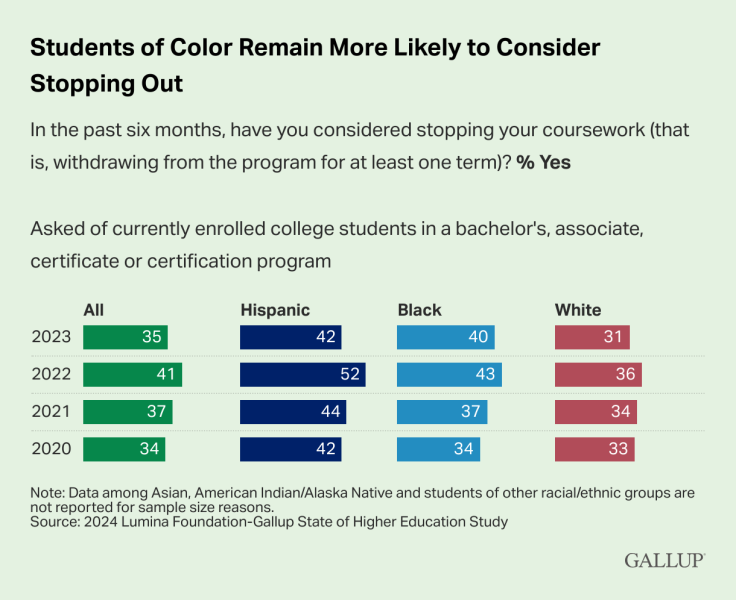
Latinos enrollment in postsecondary programs in the U.S. increased slightly last year, but they are the demographic with the highest chance of dropping out, according to a new Gallup survey.
Concretely, members of the demographic were the most likely to consider leaving their programs over the past six months. Emotional stress, mental heath and cost ranked the highest among the reasons given to possibly drop out.
42% of Latino students said this was the case for them, more than Blacks (40%) and Whites (31%). Even though they are still the demographic with the most responses of the kind, the amount has decreased significantly compared to 2022, when over half (52%) had given this answer. Figures have now gone back to 2020 levels, but Latinos continue to be above average (35% in 2023).

About 60% of Latinos unenrolled said they have considered signing up for a program in the past two years, with certificate and associate programs being the most attractive for them.
Delving into the reasons to consider dropping out, emotional stress sat at the top, with half of Latino respondents giving that answer. Personal and mental health reasons was the second (43%) and the cost of the degree the third (30%). Myriad other reasons were given, finding a new job, the course not being relevant to their future career and no longer being interested among them.
As for the programs themselves, Latinos are more likely to consider certificate (24%) or associate degrees (22%). Interest for bachelor's degrees has dropped across the board, with 17% of all respondents being interested in one (18% of Latinos). Industry certification elicited the least amount of interest among Latinos, with 17%
Financial aid and scholarships are key to attracting prospective students and retain them. "Although each of these is important to Black, Hispanic and White Americans, financial aid and scholarships are even more important to unenrolled Black and Hispanic Americans," the study highlighted.
59% of Latinos said that this was very important to get them to enroll, compared to 53% overall and 50% if Whites. 44% also said that emergency aid would influence their enrollment.
"Greater flexibility in one's work and personal schedule is also more important to Black (55%) and Hispanic (54%) unenrolled adults than to their White peers (46%)," the study added.
Despite the challenges, Latino enrollment in higher education has increased significantly. According to Excelencia en Educación, the Latino student population has risen from 1.5 million in 2000 to 3.8 million in 2019 and more than 4 in 10 Hispanic students are the first in their family to attend college.
© 2025 Latin Times. All rights reserved. Do not reproduce without permission.





